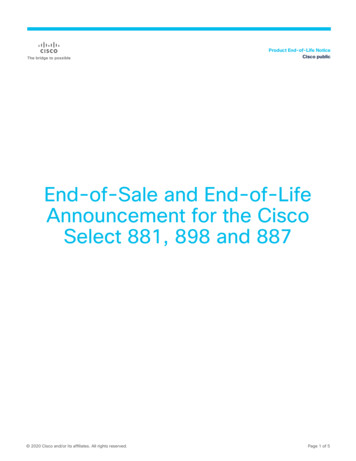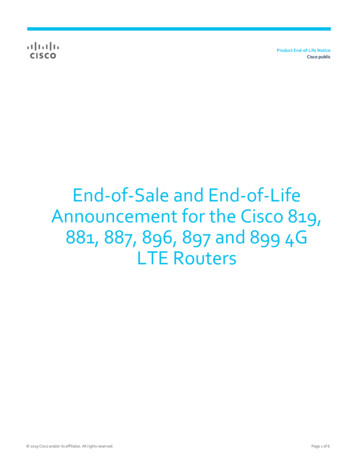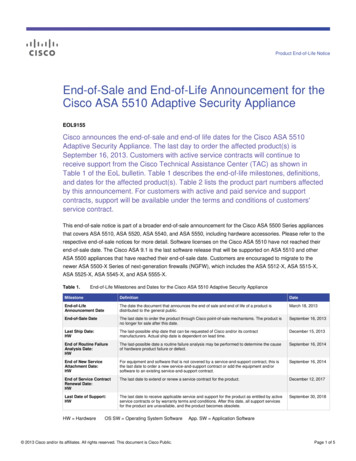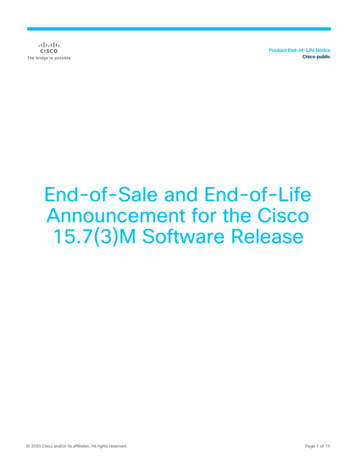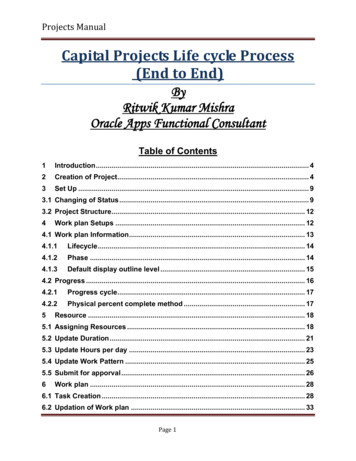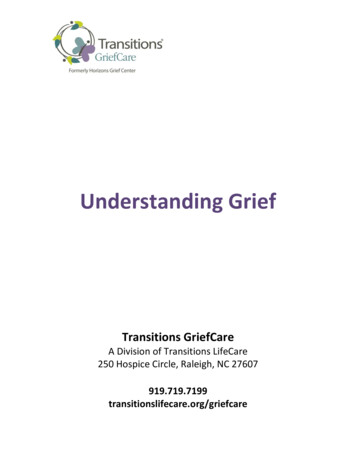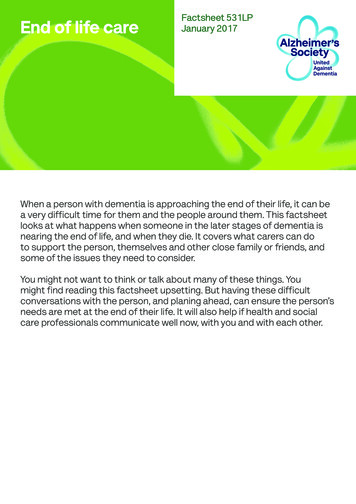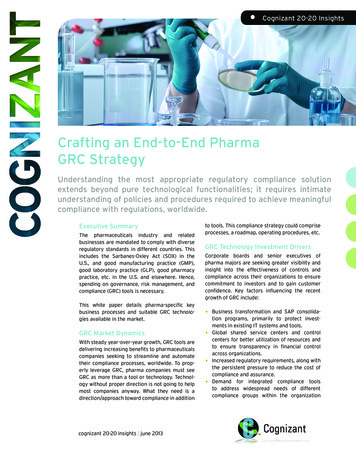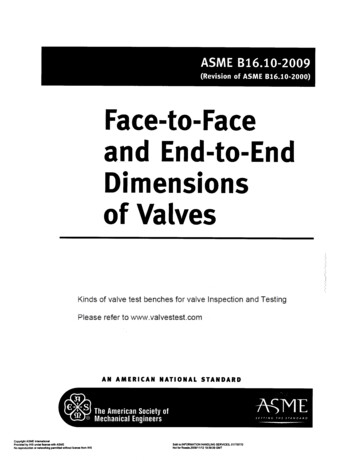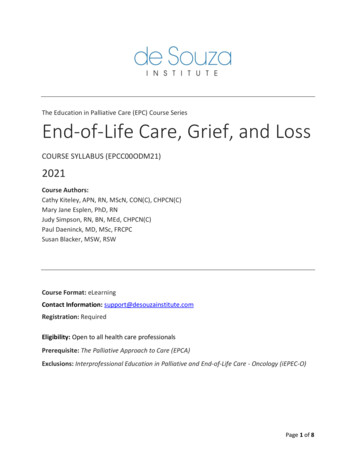
Transcription
The Education in Palliative Care (EPC) Course SeriesEnd-of-Life Care, Grief, and LossCOURSE SYLLABUS (EPCC00ODM21)2021Course Authors:Cathy Kiteley, APN, RN, MScN, CON(C), CHPCN(C)Mary Jane Esplen, PhD, RNJudy Simpson, RN, BN, MEd, CHPCN(C)Paul Daeninck, MD, MSc, FRCPCSusan Blacker, MSW, RSWCourse Format: eLearningContact Information: support@desouzainstitute.comRegistration: RequiredEligibility: Open to all health care professionalsPrerequisite: The Palliative Approach to Care (EPCA)Exclusions: Interprofessional Education in Palliative and End-of-Life Care - Oncology (iEPEC-O)Page 1 of 8
EPCC00ODM21 SyllabusA. COURSE DESCRIPTIONEnd-of-Life Care, Grief, and Loss is the third course in de Souza Institute’s comprehensiveEducation in Palliative Care (EPC) course series. The course series is built on the 2017 de Souzaonline palliative care course, interprofessional Education in Palliative and End of Life CareOncology (iEPEC-O1).Course 03 - End-of-Life Care, Grief, and LossThe End-of-Life Care, Grief, and Loss course builds upon what you have learned in course 01 –the Palliative Approach to Care. This third course is divided into two sections and five modules.The first section, End-of-life Care, covers the sensitive topics of withdrawing and withholdinglife-sustaining interventions and how to assess, manage and support the patient's familythrough the physiological changes of dying. The second section, Grief, Loss, and Bereavement,covers how to help the patient, family, and care team to cope with loss, grief, andbereavement.Although you can complete the course modules at your own pace, you must complete all fivemodules, and the final quiz within five weeks of the course start date (this date can be foundon the course information page in My Account).About the EPC Course SeriesThe EPC course series consists of three courses that teach a comprehensive curriculumin palliative and end-of-life care: Course 01 - The Palliative Approach to Care Course 02 - Symptom Assessment and Management in Palliative Care Course 03 - End-of-Life Care, Grief, and LossThese three courses cover a wide-range of competencies in providing person-centered care forpatients living with serious illness such as cancer, end-stage renal disease (ESRD), congestiveheart failure (CHF), or chronic obstructive pulmonary disease (COPD). Completing all threecourses in the series will earn you the de Souza Certificate in Palliative and End-of-Life Care.1This curriculum has been adapted and updated from the EPEC –O Curriculum, which was developed by the U.S. NationalCancer Institute in collaboration with the American Society for Clinical Oncology and the EPEC Project team and tailored tothe Canadian context by EPEC-O Canada:Emanuel, L.L., Ferris, F.D., von Gunten, C.F. and Von Roenn, J. (2005). Education in Palliative and End of Life Care –Oncology. The EPEC Project, Chicago. ISBN #0971418063.Daeninck, P., Hanvey, L., Hauser, J., Librach, L., Preodor, M., Simpson, J. (2010). Education in Palliative and End of LifeCare - Oncology- Canada. Canadian Partnership Against Cancer.Page 2 of 8
EPCC00ODM21 SyllabusB. de Souza DESIGNATION CREDITSDomain of Practice Therapeutic and Supportive RelationshipsLearning Hours 9 hoursde Souza Credit 0.25 creditTHE DE SOUZACertificate in Palliative and End-of-life CareAfter completing this course, you may choose to complete the remainingcourse in the EPC course series, Symptom Assessment and Management inPalliative Care, to earn the de Souza Certificate in Palliative and End-of-LifeCare. For more information about the certificate visit:https://www.desouzainstitute.com/epcC. COURSE OBJECTIVESBy the end of this course, you will be able to: Explain the principles of withholding or withdrawing the following life-sustainingtherapies: artificial nutrition and fluids, dialysis, and implantable cardioverterdefibrillators (ICD). Describe how to help families and professionals find alternate ways to provideappropriate physical care and emotional support to the patient, when treatments such asfood and fluids are withdrawn. Describe how to assess, manage, and support the patient's family through thephysiological changes of dying. Differentiate between the concepts of loss, grief, and bereavement and describepersonal factors that contribute to grief reactions. Differentiate between uncomplicated, complicated and anticipatory grief. Identify strategies for supporting patients and caregivers with "pre-loss" grief oranticipatory grief. Describe the assessment and management of prolonged grief. Differentiate the symptoms of grief from the symptoms of depression. Identify follow-up strategies to support bereaved family members. Recognize the signs and symptoms of burnout and compassion fatigue. Identify strategies for coping with job stress and strategies to prevent burnout.Page 3 of 8
EPCC00ODM21 SyllabusD. MODE OF LEARNING: eLearningThe eLearning environment fosters a self-directed approach. You can progress through themodules and exercises at a convenient time, at home or work. The course timetable, in SectionG of the course syllabus, outlines our suggested weekly expectations for participants.eLearning Modules: Modules were developed by the de Souza education team to reflect thelatest knowledge in palliative care. The content is up-to-date and includes interactiveapplication exercises and links to the latest clinical guidelines.E. MODES OF EVALUATIONAs part of the evaluation process, you are required to complete the following: A Baseline Participant Survey: This survey assesses your knowledge, attitude, andconfidence before you begin the eLearning modules for the course. eLearning Modules: You must complete all 5 modules by the course end date. Final Quiz: The final quiz consists of 10 multiple choice questions. You must answer 7/10questions correctly (70%) to pass. You have two attempts to achieve a passing grade. Course Evaluations: At the end of the course, you will be asked to complete a “CourseEvaluation” to provide your feedback on whether the content met your professionalpractice needs. These surveys are facilitated electronically through eLearning.When you have met each of the above requirements, you will receive 9 learning hours and 0.25de Souza credits towards obtaining your de Souza designation. An email will be sent to you onhow to download your certificate of completion via your “My Account”.F. EXPECTATIONS FOR PARTICIPANTSTo be successful in completing this course, you are encouraged to set aside about 2-3 hourseach week to complete each week’s activities. The total learning hours for this course is 9hours. Your course activity completion will be reflected in your grade book. Below is abreakdown of the learning hours for each module:Section 01 – End-of-life CareModule 01 - Withdrawing and Withholding Treatments2.5 learning hoursModule 02 - End-of-life Care2.5 learning hoursSection 02 – Grief, Loss and BereavementModule 03 - Grief and Loss during Serious Illness1.5 learning hoursModule 04 - Bereavement Care1.5 learning hoursPage 4 of 8
EPCC00ODM21 Syllabus1.0 learning hourModule 05 - Burnout and Compassion Fatigue in Health CareWorkersTOTAL 9 learning hoursG. SUGGESTED COURSE TIMELINESuggested Weekly eLearning ActivitiesYou do not have to complete the weekly course activities exactly as outlined below.However, you must complete all course requirements within five weeks of startingthe course. Learner AgreementWeek 1 Participant Baseline Survey Module 01 - Withdrawing and Withholding Treatments (2.5 hours)Week 2Week 3Week 4Week 5 Module 02 - End-of-life Care (2.5 hours) Module 03 - Grief and Loss during Serious Illness (1.5 hours) Module 04 - Bereavement Care (1.5 hours) Module 05 - Burnout and Compassion Fatigue in Health CareWorkers (1 hour) Final Quiz Course EvaluationH. FACILITATOR AVAILABILITYThis course is self-directed. However, a course facilitator is available to: Answer your questions related to course content. Monitor the registration process. Be available to you for questions throughout the course.You can expect the facilitator to respond to your questions within 48-hours during the weekand within 72 hours on the weekend.Facilitator Contact: support@desouzainstitute.comPage 5 of 8
EPCC00ODM21 SyllabusI. COURSE AUTHORS BIOGRAPHIESThe EPC course series was written and designed by an interprofessional team:Cathy Kiteley, APN, RN, MScN, CON(C), CHPCN(C)Catherine Kiteley is a clinical nurse specialist in the area of oncology and palliative care. She hasboth her Oncology and Palliative certification from the Canadian Nurses Association and is along-standing member of CANO.Over her career, Cathy has engaged extensively in research, professional practice andeducation. She holds a master’s degree in nursing from U of T and has been involved inteaching activities at de Souza Institute and LEAP. Prior to retiring from her full-time role atTrillium Health Partners, she was an active clinician and regularly mentored nursing, interprofessional and medical students in oncology and palliative care. She was part of thedevelopment team for several CCO symptom management guides. She taught and evaluatedworkshops in emotional care, led an innovation in triaging and navigating palliative carereferrals at Trillium, and she also facilitates numerous programs at Wellspring cancer wellnesscentre. Cathy currently works at the Ian Anderson Hospice as the professional practicecoordinator.Mary Jane Esplen, PhD, RNDr. Esplen is a Full Professor and Vice-Chair, Equity and Inclusion in the Department ofPsychiatry, Faculty of Medicine, University of Toronto. She has held roles as Scientist andClinician at the University Health Network and Mount Sinai Hospital and developed and wasExecutive Director of the de Souza Institute from 2008 to 2020.Dr. Esplen held Career Scientist awards from CIHR and NCIC for her research program inpsychosocial oncology. She led studies focused on the psychological impact of having cancerand / or of genetic testing, as well as randomized trials of individual or group psychotherapeuticinterventions to address coping, body image issues or grief and loss. She also completed aseries of studies to develop and validate psychometric instruments to address psychologicalimpact of carrying a gene mutation on self-concept.Dr. Esplen has a PhD, Institute of Medical Science, University of Toronto followed by a Postdoctorate fellowship in psycho-oncology at Samuel Lunenfeld Research Institute andDepartment of Psychiatry, University of Toronto. She also completed the training program atthe Toronto Institute of Psychoanalysis. Dr. Esplen’s academic work was recognized with alifetime achievement award from the Canadian Association of Psychosocial Oncology and shewas the 2020 recipient of the prestigious Bernard Fox Memorial Award from the InternationalPsycho-oncology Society.Page 6 of 8
EPCC00ODM21 SyllabusJudy Simpson, RN, BN, MEd, CHPCN(C)Judy Simpson’s nursing career spans more than forty years and consists of diverse roles,including staff nurse, educator, administrator, mentor, consultant and volunteer — most ofwhich were devoted to the advancement of palliative care nursing in Canada. Since retiring in2009, she has taken on several key roles in the not-for-profit sector, such as consulting for thePalliative and End-of-life Care-Oncology Canada education program and serving as president forthe Canadian Hospice Palliative Care Nurses Group.Judy sees nurses as key leaders who are critical to the development of quality health care for allCanadians, with the Canadian Network of Nursing Specialties playing an active role in shapinghealth care in the country. With her strong background in the advancement of nursing practiceand interprofessional education, developing, leading and evaluating projects and co-authoringstandards, competencies and practice guidelines, Judy fully understands the value of life-longlearning and ongoing personal and professional development.Judy’s accomplishments include her formative work in establishing the CNA CertificationProgram’s hospice palliative care nursing specialty designation: CHPCN(C).Susan Blacker, MSW, RSWSusan Blacker is the Senior Director, Cancer and Palliative Program Planning and Performanceat Sinai Health System in Toronto, Ontario. In April 2018, Susan was appointed the ProvincialClinical Co-Lead position for the Ontario Palliative Care Network. She is also appointed as theQuality Co-Lead and status-only Lecturer, Division of Palliative Care, Department of Family &Community Medicine, and is an Adjunct Professor at the Factor-Inwentash Faculty of SocialWork at the University of Toronto.Susan has been a recognized leader within the field of social work in palliative care for morethan 15 years. Her experience includes clinical care, teaching and program development. Shehas participated in a number of regional and national palliative care projects in both Canadaand the United States over the past decade, including being a founding board member of theSocial Work in Hospice and Palliative Care Network. Her interests include interprofessionaleducation and development of palliative care programs in the acute care setting.Paul Daeninck, MD, MSc, FRCPCDr. Paul Daeninck is a medical oncologist and palliative medicine consultant with Cancer CareManitoba and the Winnipeg Regional Health Authority (WRHA) Palliative Care Program. He isthe Site Coordinator at the St. Boniface Hospital, and Chair of the Symptom Management andPalliative Care Disease Site at Cancer Care Manitoba. He is an Assistant Professor and Leader forthe Palliative Care Longitudinal Theme at the Medical School of the University of Manitoba.Dr. Daeninck has served with several national organizations, including those of the CanadianSociety of Palliative Care Physicians and Canadian Partnership Against Cancer. He sits on thePage 7 of 8
EPCC00ODM21 SyllabusBoard of Directors of the Canadian Consortium for the Investigation of Cannabinoids (CCIC), andis currently a co-chair of the Royal College Conjoint Advisory Committee on Palliative Medicine.Dr. Daeninck is the author of several research papers as well as textbook chapters. He serves asa reviewer for palliative medicine journals. He has been active in medical student and residenteducation and has ongoing research interests in several aspects of palliative medicine, includingthat of cannabinoid use in patients with cancer.J. VIRTUAL LIBRARYde Souza Institute has a virtual library that can be accessed to those registered in this course orany other de Souza Institute continuing education program. This resource enables you to accessover 1500 e-Journals, 200 e-books and 8 on-line databases such as CINAHL or Ovid-Medline.You can use the virtual library to access the additional reading materials for your course. Thevirtual library can be accessed 24 hours a day using your login and password. The direct link is:https://library.desouzainstitute.com/login.K. TECHNICAL SUPPORTeLearning Centre OrientationThe eLearning Centre Orientation is designed to introduce you to online learning and to helpyou understand how to navigate through the de Souza Institute eLearning centre and courses. Itis strongly recommended that you complete this orientation so that you will be able tosuccessfully navigate de Souza’s eLearning environment.de Souza Institute SupportIf you have questions about the content of a course please email de Souza Support.If you need assistance accessing or navigating the eLearning Centre, please refer to theeLearning Orientation course. If you have questions or have any technical difficulties, pleasecontact support@desouzainstitute.com.L. POLICIES AND PROCEDURESClick the links below to read de Souza Institute’s Academic Honesty and Copyright; andcancellation, incomplete and no show policies.Academic Honesty and Copyright PolicyCancellations, Incomplete and No Show PolicyCourse content and resources provided in this course are based on best practice guidelinesfrom provincial and national bodies. Local protocols and policies vary among healthcareorganizations; please consult educators within your organization if you have specific questionsrelated to local protocols and policies.Page 8 of 8
EPCC00ODM21 Syllabus Page 2 of 8 A. COURSE DESCRIPTION End-of-Life Care, Grief, and Loss is the third course in de Souza Institute’s comprehensive Education in Palliative Care (EPC) cour
